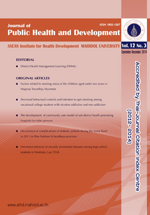Factors affecting utilization of quality antenatal care services among Myanmar migrants in Thai hospitals: Tak and Samut Sakhon Province
Main Article Content
Abstract
This cross-sectional study was conducted to investigate the factors affecting the utilization of quality antenatal care services among Myanmar migrant women in Thai health care facilities at Tak and Samut Sakhon. The sample size was 402 Myanmar migrant women selected by purposive sampling from Mae Tao clinic and Samut Sakhon hospital. The data were collected through face to face interview using structured questionnaires. Descriptive statistics were used to describe the characteristics of the sample. Chi-square test and multiple logistic regressions were used to determine the association between independent variables and utilization of quality antenatal care.
The finding showed that 53% of the women utilized quality antenatal care services with 2 criteria; whereas 62.4% had early visit of antenatal care within the first trimester of pregnancy and 73.9% utilized antenatal care services at least 5 times or more. Utilization of quality antenatal care services was significantly associated with the place of residency, women’s age, women’s education, number of pregnancy, number of children, intention to pregnancy, staying in Thailand in first 3 months of pregnancy, knowledge level, attitude, legal status, presence or absence of health insurance, family’s income, social support, satisfaction, accessibility and availability of antenatal care services. After adjusting with other variables, multiple logistic regression revealed that urban women were 3.5 times more likely to utilize early and regular antenatal care services than rural counterparts. Women who did not have plan to go back to Myanmar, with higher knowledge, higher social support, and higher satisfaction to antenatal care services were more likely to utilize quality antenatal care services than those who planned to go back to Myanmar, had lower knowledge, lower social support and lower satisfaction level to antenatal care services with OR 3.35, 2.82, 2.63 and 1.73 respectively.
From the result of this study, interventions such as public health education and health promotion concerning antenatal care should be undertaken especially in the rural area. Moreover, policies to encourage utilization of ANC by migrant women should be implemented in order to increase the rate of utilization of quality antenatal care services.


